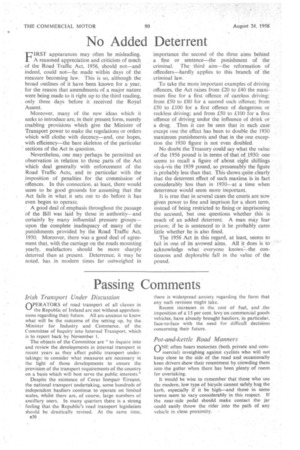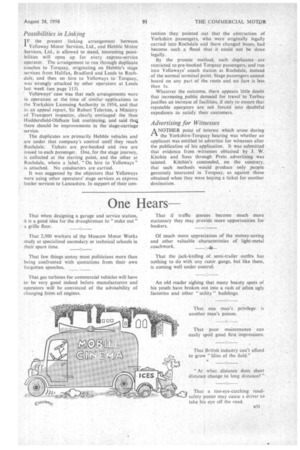Passing Comments
Page 36

Page 37

If you've noticed an error in this article please click here to report it so we can fix it.
Irish Transport Under Discussion
OPERATORS of road transport of all classes in
the Republic of Ireland are not without apprehensions regarding their future. All are anxious to know what will be the outcome of the setting up, by the. Minister for Industry and Commerce, of the. Committee of Inquiry into Internal Transport, which is to report back by November 1.
The objects of the Committee are "to inquire into and review the developments in internal transport in recent years as they affect public transport undertakings; to consider what measures are necessary in the light of those developments to ensure the provision of the transport requirements of the country on a basis which will best serve the public interests."
Despite the existence of Coras Iornpair Eireann, the national transport undertaking, some hundreds of independent hauliers continue to operate on limited scales, whilst there are, of course, large numbers of ancillary users. In many quarters there is a strong feeling that the Republic's road transport legislation should be drastically revised. At the same time.,
B30 . there is widespread anxiety regarding the form that any such revision might take.
Recent increases in the cost of fuel, and the imposition of a:15 per cent. levy.on commercial goods vehicles, have already brought-hauliers, in particular, face-to-face with the need for difficuif decisions concerning their future.
Pot-and-kettle Road Manners
nNE often hears motorists (both private and com‘-' mercial) inveighing against cyclists who will not keep close to the side of the road and occasionally keen drivers show their resentment by crowding them into the gutter when there has been plenty of room for overtaking.
It would be wise to remember that those who use the modern, low type of bicycle cannot safely hug the kerb, especially if it be high—and those in some tOwns seem to vary considerably in this respect. If the nearside pedal should. make contact the jar could easily throw the rider into the path of any vehicle in close proximity.
Possibilities in Linking
IF the present linking arrangement between I Yenoway Motor Services, Ltd., and Hebble Motor Services, Ltd., is allowed to stand, interesting possibilities will open up for every express-service operator. The arrangement to run through duplicate coaches to Torquay, originating on Hebble's stage services from Halifax, Bradford and Leeds to Rochdale, and then on hire to Yelloways to Torquay, was strongly attacked -by other operators at Leeds last week (see page 113). Yelloways' case was that such arrangements were in operation at the time of similar applications to the Yorkshire Licensing Authority in 1954, and that in an appeal report, Sir Robert Tolerton, a Ministry of Transport inspector, clearly envisaged the then Huddersfield-Oldham link continuing, and said thal there should be improvements in the stage-carriage service.
The duplicates are primarily Hebble vehicles and are under that company's control until they reach Rochdale. Tickets are pre-booked and two are issued to each passenger. One, for the stage journey, is collected at the starting point, and the other at Rochdale, where a label, "On hire to Yelloways" is attached. No conductors are carried.
It was suggested by the objectors that Yelloways were using other operators' stage services as express feeder services to Lancashire. In support of their con
tention they pointed out that the abstraction of Yorkshire passengers, who were originally legally carried into Rochdale and there changed buses, had become such a flood that it could not be done legally.
By the present method, such duplicates are restricted to pre-booked Torquay passengers, and run into Yelloways' coach station at Rochdale, instead of the normal terminal point. Stage passengers cannot board on any part of the route and no fare is less than Is.
Whatever the outcome, there appears little doubt that increasing, public demand for travel to Torbay justifies an increase of facilities, if only to ensure that reputable operators are not forced into doubtful expedients to satisfy their customers.
Advertising for Witnesses
ANOTHER point of interest which arose during the Yorkshire-Torquay hearing was whether an applicant was entitled to advertise for witnesses after the publication of his application. it was submitted' that evidence from witnesses obtained by I. W. Kitchin and Sons through Press advertising was tainted. Kitchin's contended, on the contrary, that such methods would produce only people genuinely interested in Torquay, as against those obtained when they were buying a ticket for another destina Lion.












































































































